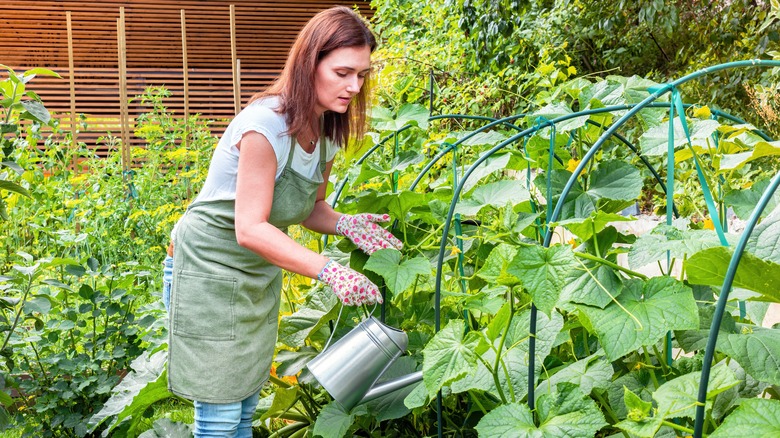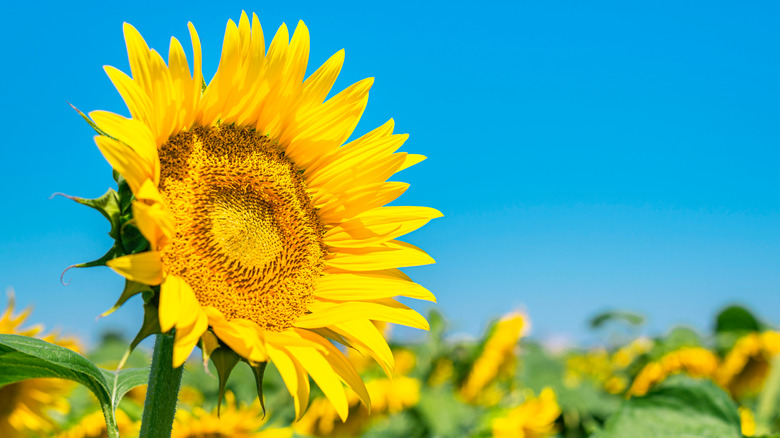This Sunny Flower Is A Great Companion Plant For Cucumbers
Farmers and gardeners have been using companion planting for centuries, pairing certain plants to their mutual benefit. This allows plants to work together to support, protect, or nurture one another. In some cases, companion planting is used to maximize gardening space. When choosing what to plant, cucumbers are very versatile in both the kitchen and garden. They work well with various other plants, but sunflowers are great companion plants for cucumbers and support their growth and vitality.
Sunflowers bring a bright and cheery look to your yard, but they have more to offer besides their beauty. They have a high pollen content, easily attracting pollinators such as bees, hummingbirds, wasps, and butterflies, which are vital in helping plants produce seeds and healthy fruit. This provides important support to cucumbers that are already vulnerable to diseases and pests that rob them of the nutrients and resources they need to thrive.
Why sunflowers and cucumbers make great companion plants
Sunflowers and cucumbers make the perfect team in the garden. Sunflowers can work together to provide shade for plants and vegetables like cucumbers and tomatoes that need shade or only partial exposure to the sun and can provide support for their growing vines to climb and intertwine as they mature. Marigolds can also make great companion plants for sunflowers by working as trap crops for pests that will not only draw pests away from cucumbers and other vulnerable plants, but will also work to attract good predators like ladybirds, soldier beetles, and wasps that will feed off pests like aphids and thrips. Because cucumber roots don't take up a lot of space beneath the soil, they can also be planted alongside root vegetables like carrots, radishes, and onions.
Even though cucumbers and sunflowers can work very well together and with other plants, some plants shouldn't be near them to avoid creating new problems. Both sunflowers and cucumbers shouldn't be planted with potatoes. Cucumbers and potatoes are susceptible to the same fungal diseases because of their moisture content, so to avoid spreading fungus, they should be kept apart in the garden. Sunflowers can stunt your potatoes' growth because sunflowers have allelopathic properties. They release a chemical that affects the growth and development of some plants. This is fine if you are dealing with weeds but it's bad news for your potato yield.
Potential drawbacks of planting sunflowers
Sunflowers can seem like a great option for attracting pollinators and supporting your cucumbers, but there are some pros and cons to growing sunflowers in your yard. Despite all the good they do for other plants in your garden, they are not without their issues. Although the allelopathic properties of sunflowers can help get rid of weeds, they can also deteriorate the health and growth of your lawn. The same strong stems that can provide support for your vining vegetables can later be weighed down by the sunflowers' large seed heads, especially when the sunflower seeds are ready for harvesting. This means they can easily fall over during windy weather and scatter their petals all over the yard, creating a mess.
Even though the delicious sunflower seeds can attract goldfinches and other beneficial birds that can keep insect populations down, the seeds are just as good for rabbits and squirrels. These uninvited furry friends might be welcome to feast on the sunflower seeds but there's no rule that says that's the only thing they can eat. Squirrels will ransack your garden as they dig and scout for other fruit and vegetables they can eat before winter.


